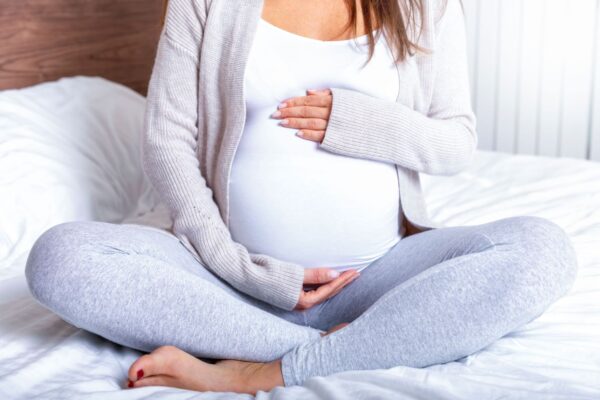Having a Healthy Pregnancy with Crohn’s and Celiac Disease
Anne Marion, mother of two, and early childhood educator
By Anna Gomberg
“I’ve always wanted kids. When I got married in April of 2018, my husband and I just knew we wanted to start trying right away… and I ended up getting pregnant just four months after getting married!” says Anne Marion, a patient of Sushila Dalal, MD, Assistant Professor of Medicine, at the University of Chicago Medicine Inflammatory Bowel Disease Center.
Now the proud mother of one-year-old Sophia, and Eli, just two months old, Anne was diagnosed with Crohn’s disease and celiac disease while in college. After her diagnosis, she saw a gastroenterologist at a community health system before beginning her care with Dr. Dalal at UChicago Medicine.
To achieve remission for her Crohn’s disease, Dr. Dalal prescribed infliximab (Remicade®), which Anne took every eight weeks via infusion. “I love working with Dr. Dalal. I feel like she always answers my many questions. If I had concerns, she would say, ‘Okay, let’s try to figure it out.’ Finally feeling better made such a world of difference; it was like, ‘this is what it feels like to not be in pain!’” says Anne.
Anne strictly adheres to a gluten-free diet to manage her celiac disease. Fortunately, “gluten-free options for celiac have improved so much,” says Anne. “When I was diagnosed, people would say, ‘oh there’s so much more out there now,’ but I even think from 2013 to 2021, there has been a major improvement in the offerings.”
Consistent with the best practices for Crohn’s disease care, Anne remained on her medical therapy throughout her pregnancies. While she was initially worried about the effects of medications on a developing baby, Anne was put at ease by the ongoing research that shows that biologic medications for Crohn’s are safe for pregnancy and beyond.
Unfortunately, Anne’s pregnancy with Sophia was challenging. “I had terrible morning sickness. I lost 20 pounds, I couldn’t keep anything down, even fluids, and I had terrible migraines,” explains Anne.
When Anne detailed her symptoms, including chills and low-grade fever, Dr. Dalal suggested it might be a Crohn’s flare. Dr. Dalal did blood tests to look for markers of inflammation. When they were found, she prescribed Anne a short course of steroids, and increased the dosage and frequency of her infliximab infusions. After this adjustment, the remainder of Anne’s first pregnancy was normal, and Anne gave birth to a healthy, full-term baby girl, Sophia.
And then, just nine months later, Anne realized she was pregnant again. “I can only blame quarantine,” laughs Anne. After a healthy, normal pregnancy, Anne gave birth to her son, Eli, in December of 2020.
Anne worries that Sophia and Eli could have Crohn’s disease or celiac disease in the future, but she is optimistic. “Things will be different for my kids,” she says. “I had no idea the symptoms I was feeling meant that I had Crohn’s and celiac disease. Now, looking at my kids, I will be able to say, ‘these were things I experienced.’ And take them right away to see a gastroenterologist who specializes in little kids.”
Says Anne, “I’m still young, and there’s still a lot of time for new treatments to be developed. I know scientists are researching cures for the Crohn’s, where you don’t have to be on medication for your whole life, and that seems so cool. The idea that it could be possible in my lifetime gives me hope.”

